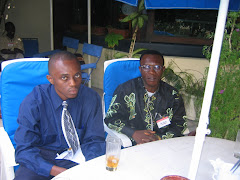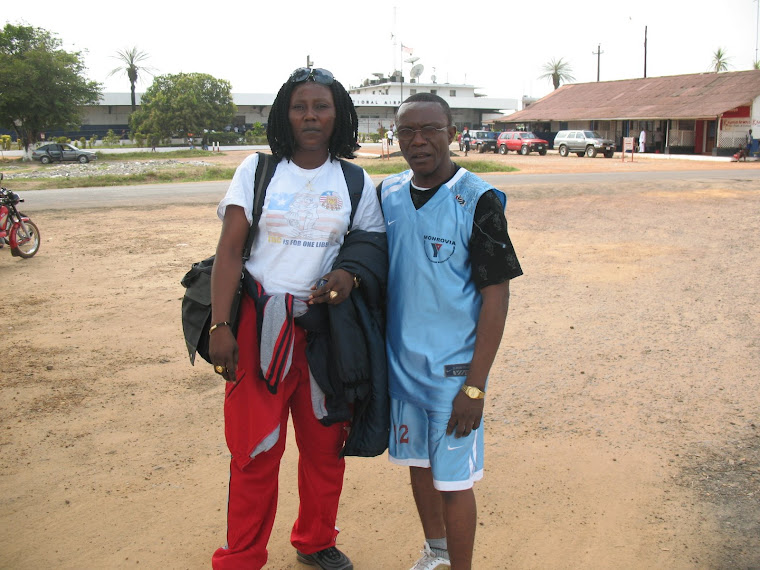…Bryant Admits Authorization of Funds; Defends LPRC
On his second day in the dock at the Criminal Court “C” hearing the “Economic Sabotage” charges the State brought against him, defunct National Transitional Government of Liberia (NTGL) Chairman Charles Gyude Bryant, has put up defense for the Edwin Melvin Snowe regime of the Liberia Petroleum Refining Company (LPRC), saying that the close to US$1m expended by the LPRC during the transitional regime was spent based upon his directive.
Mr. Bryant, the fourth witness in the marathon case, rather toke responsibility for the use of the funds for which he and the Liberia Petroleum Refining Company (LPRC) managers are being prosecuted for the reported commission of “Economic Sabotage”. The transitional chairman told court that the money was used on security matters to safe guard the fragile peace of Liberia in 2003.
The NTGL Chairman is being prosecuted along with four of his LPRC officials including Montserrado County Representative Edwin Snowe and his deputies while served as LPRC managing Director under the transitional regime of Chairman Bryant.
Mr. Bryant and four other former officials of the Liberian Petroleum Refining Company including Edwin M. Snowe, Jr., Richard Devine, Siaka A. Sheriff and G. Andy Quamie are on trial for allegedly conspiring to take away close US$1 million from the coffers of the LPRC during the interim administration. However the accused have pleaded “NOT GUILTY” to charges brought against them.
Mr. Bryant told the court that the monies were spent at different times upon his instruction to quell trouble by ex-fighters in various parts of the country so as to prevent the country from slipping back to chaos after the signing of the Accra Comprehensive Peace Accord (CPA).
The CPA brought Bryant, a businessman, to state power at the Executive mansion. The document which was crafted by stakeholders and signed in Accra, the Republic of Ghana introduced calm to Liberia and paved the way for the elections of 2005, which brought to power the first female president of Africa, Madam Ellen Johnson Sirleaf. The national Transitional Government of Liberia (NTGL) which was installed to steer the affairs of state for two years was headed by Chairman Bryant.
Bryant was however audit by ECOWAS investigators and other international institutions such as the EU, and findings of the investigative bodies making Bryant and his team of economic managers culpable were perused by the Johnson-Sirleaf administration leading to “Economic Sabotage” Charges against them
During his testimonies in court, the defunct NTGL Chairman Charles Gyude Byant said the monies were mainly given to ex-rebel leaders to help talk with their men who were at some point disgruntled over disbarment benefits and in some places refused to disarm, explaining that none of the payments were made to him or people from the Executive Mansion, his office.
He explained, “Instructions and directives from me to LPRC were to pay monies out to people. None of them work in my office,” and added that how LPRC Management or Board wrote the internal instructions to the Account Staff to make payments was totally out of his control and knowledge.
“All I knew was for example there was a particular threat because a senior official or cabinet minister or example has been taken hostage by their supporters who they were unable to give jobs to, they wanted jobs. Other times there were incidents in the Guthrie Rubber Plantation for example where combatants had been disarmed but have not gone through the PR portion of the NCDDRR because the UN that were funding this program has run out of funds”, Bryant told the court.
He said many of the payments were made to individuals who could help to talk with ex-combatants that were harassing civilians mainly in the South eastern region of the country where the United Nations Mission in Liberia (UNMIL) did not deploy immediately after their coming to Liberia on peace keeping mission.
Mr. Bryant revealed that at one point while preparing to tour the country, UNMIL informed him that the south east was not safe for him to travel as there were reports of gun fires and harassments.
“When the disarmament ended, I told UNMIL I am ready to the South east and that was in October 2004. They say sorry Chairman we can’t go there and I said but you have disarmed,” he claimed, noting: They said that is true but in the interior of the counties we are still getting reports of gun fires and harassments of innocent civilians.”
So he indicated that he called the commanders and their leaders because “sometimes when you deal with the leaders the commanders will come and say we didn’t get anything so how can we deal with the men.”
According to him, these commanders went to LPRC for a hundred thousand dollars to use to quiet tension, for instance, since “I am about to go to the southeast and before I go there I want to hear that all the troubles and harassments have ended. They went, they dealt with their people, UNMIL was then able to deploy into those areas and then I was able to go there and that was not money I had in my pocket”.
The former NTGL Chairman said he gave LPRC the instruction to pay the monies out and charge it to what the company saw was partial dividend or donations and contributions to government, while at his end, he only wanted the money to keep Liberia peaceful.
Responding to question from prosecution lawyers on whether receipts were issued during the payments to these individuals by the LPRC to whom the numerous payments including an amount of US$100,000 and US$300,000 were made, the former NTGL chairman told the court he was not concerned with the issuing of receipts but the availability of the money to serve the purpose at the time.
“I do not know because I did not work ever for LPRC. What I know is that those to whom I directed that funds be given to, received the funds; they carried out the missions and the intended objectives were satisfied”, Bryant declared.
On a bank account that was opened by the Management of LPRC at the time with US$25,000 at Eco Bank, a sub-regional bank and the money used to sponsor a trip by some officials of the LPRC to attend a seminar in Ghana, Mr. Bryant denied having knowledge on the opening of such account.
He however admitted that the International Monetary Fund (IMF) organized a program for financial institutions from Liberia and it was held in Ghana due to the prevailing security situation in Liberia at the time.
“I knew nothing about this account. I did not authorize it and defendant Snowe has told this court and jury that his Board had authorized this transaction. However, I can confirm to you that it is true that the IMF did require that bi-lateral discussions be held in Accra, Ghana for security reasons. That decision did not only affect LPRC, it also affected Finance Ministry staffers. Budget Bureau staffers, Planning Ministry staffers, Central Bank staffers and members of my Council of economic advisors”, Bryant continued.
The former transitional head of state’s admittance that he sanctioned the numerous payments made by the LPRC to several individuals summing up to about US$ 1million without caring for receipts or vouchers has created what legal pundits described as a shift in the ongoing trial involving him and four other former officials of the Liberian Petroleum Refining Company including Edwin M. Snowe, Jr., Richard Devine, Siaka A. Sheriff and G. Andy Quamie.
With the admittance, the trial will now be focusing on finding out how the monies were expended and to whom all the payments were made as the former Liberian leader has taken full responsibility of the overall spending of the close to US$1 million.
But with Mr. Bryant’s testimony that he only ordered the payments and was not responsible to instruct LPRC to issue receipts, opinions solicited from lawyers observing the trial indicates that the former officials of the LPRC will now be made to state whether they issued receipts and if not why such huge monies ere spent without records.
Meanwhile Bryant continues in the witness stand today on the cross. He started his testimonies on Monday during which time he admitted instructing LPRC to disburse funds for security reasons.
Subscribe to:
Post Comments (Atom)




No comments:
Post a Comment